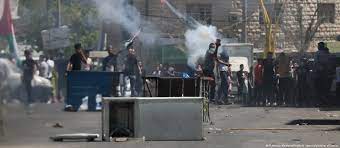
The West Bank is witnessing escalating tensions and widespread protests in the aftermath of a devastating attack on Gaza’s Al-Ahli al-Arabi hospital. The strike, which officials report resulted in the deaths of approximately 500 people, marks the deadliest single incident in Gaza since Israel initiated a campaign in retaliation for a deadly Hamas gun rampage through Israeli communities.
The attack on the Gaza hospital has sparked outrage and condemnation globally. Palestinians have vehemently blamed Israel for the strike, while Israel’s military has denied responsibility, attributing the incident to a failed Palestinian militant rocket launch.
Protests against the strike were staged at Israeli embassies in Turkey and Jordan and near the U.S. embassy in Lebanon. In the West Bank, where Palestinian President Mahmoud Abbas returned after canceling a planned meeting with U.S. President Joe Biden in Jordan, hundreds of demonstrators gathered in Ramallah’s central Manara Square. Some chanted in support of Hamas militant leaders, reflecting the deepening frustration and anger among the Palestinian population.
Clashes between protesters and Palestinian security forces also erupted in several West Bank cities, including Nablus, Tubas, and Jenin, the latter being a northern city that had witnessed significant Israeli military operations earlier this year.
The intensification of protests in the West Bank brings to light long-standing Palestinian grievances against President Abbas, whose administration has faced criticism for its security coordination with Israel in the territory. The recent events underscore the mounting pressure on Palestinian leadership amid growing resentment and discontent.
As tensions continue to rise and the situation evolves, the international community remains concerned about the potential for further unrest in the region. The quest for a peaceful resolution to the ongoing conflict remains a challenging and complex endeavor.
Sources By Agencies


